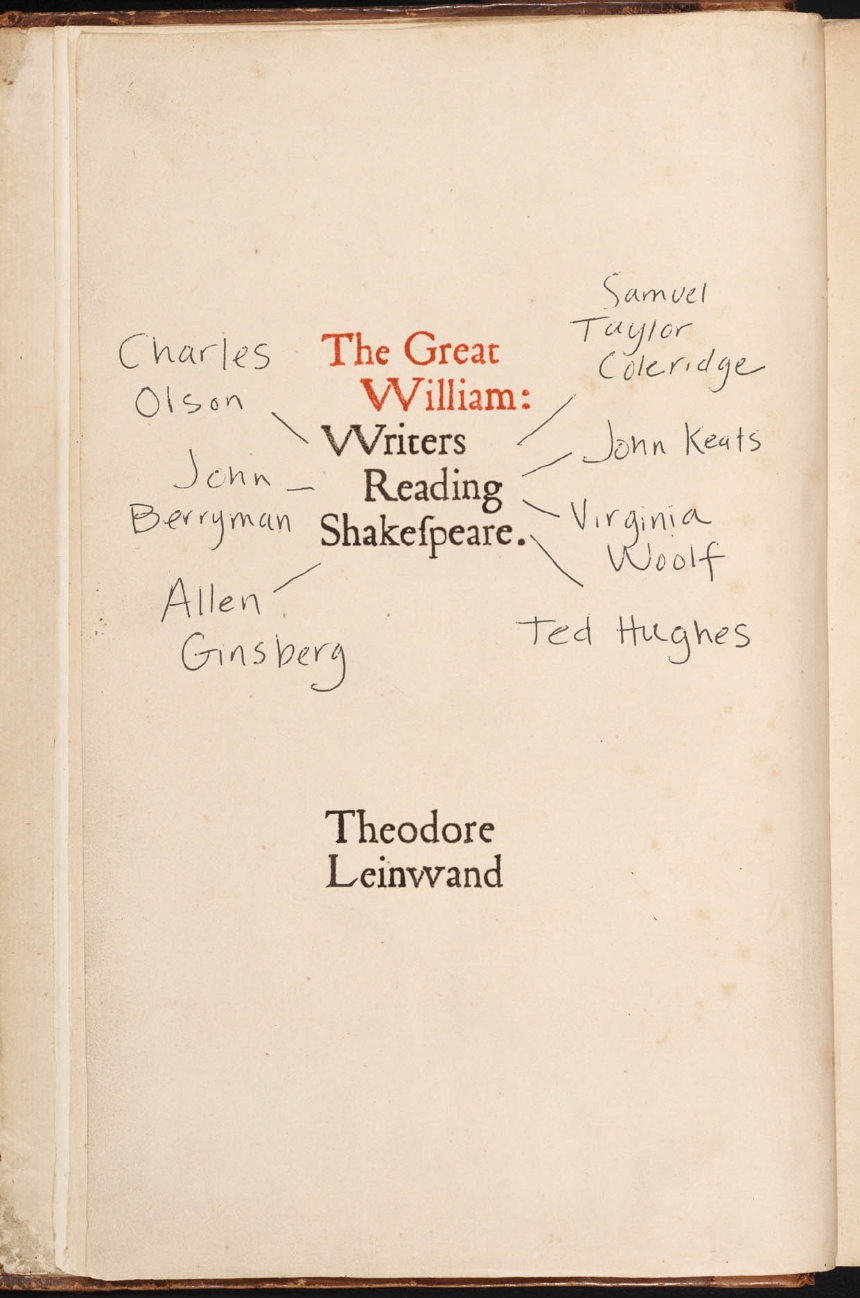The Great William
Writers Reading Shakespeare
The Great William is the first book to explore how seven renowned writers—Samuel Taylor Coleridge, John Keats, Virginia Woolf, Charles Olson, John Berryman, Allen Ginsberg, and Ted Hughes—wrestled with Shakespeare in the very moments when they were reading his work. What emerges is a constellation of remarkable intellectual and emotional encounters.
Theodore Leinwand builds impressively detailed accounts of these writers’ experiences through their marginalia, lectures, letters, journals, and reading notes. We learn why Woolf associated reading Shakespeare with her brother Thoby, and what Ginsberg meant when referring to the mouth feel of Shakespeare’s verse. From Hughes’s attempts to find a “skeleton key” to all of Shakespeare’s plays to Berryman’s tormented efforts to edit King Lear, Leinwand reveals the palpable energy and conviction with which these seven writers engaged with Shakespeare, their moments of utter self-confidence and profound vexation. In uncovering these intense public and private reactions, The Great William connects major writers’ hitherto unremarked scenes of reading Shakespeare with our own.
Theodore Leinwand builds impressively detailed accounts of these writers’ experiences through their marginalia, lectures, letters, journals, and reading notes. We learn why Woolf associated reading Shakespeare with her brother Thoby, and what Ginsberg meant when referring to the mouth feel of Shakespeare’s verse. From Hughes’s attempts to find a “skeleton key” to all of Shakespeare’s plays to Berryman’s tormented efforts to edit King Lear, Leinwand reveals the palpable energy and conviction with which these seven writers engaged with Shakespeare, their moments of utter self-confidence and profound vexation. In uncovering these intense public and private reactions, The Great William connects major writers’ hitherto unremarked scenes of reading Shakespeare with our own.
240 pages | 10 halftones | 6 x 9 | © 2016
Literature and Literary Criticism: American and Canadian Literature, British and Irish Literature
Reviews
Table of Contents
Acknowledgments
Introduction
Chapter I Samuel Taylor Coleridge’s “Impelling Thoughts” about Shakespeare
Chapter II John Keats on Sitting Down to Read Shakespeare Once Again
Chapter III Virginia Woolf Reads “the Great William”
Chapter IV Charles Olson’s “Objectist Shakespeare”
Chapter V John Berryman’s Shakespeare / Shakespeare’s John Berryman
Chapter VI Allen Ginsberg on Shakespeare’s Funny Mouthings
Chapter VII Ted Hughes Reads the Complete Shakespeare
Conclusion
Notes
Index
Introduction
Chapter I Samuel Taylor Coleridge’s “Impelling Thoughts” about Shakespeare
Chapter II John Keats on Sitting Down to Read Shakespeare Once Again
Chapter III Virginia Woolf Reads “the Great William”
Chapter IV Charles Olson’s “Objectist Shakespeare”
Chapter V John Berryman’s Shakespeare / Shakespeare’s John Berryman
Chapter VI Allen Ginsberg on Shakespeare’s Funny Mouthings
Chapter VII Ted Hughes Reads the Complete Shakespeare
Conclusion
Notes
Index
